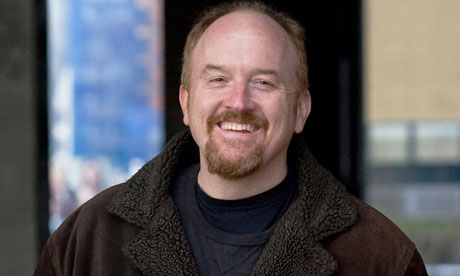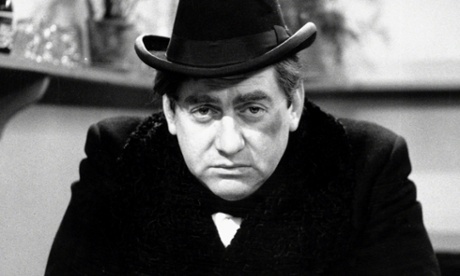Louis CK is exploding a few myths about one of pop culture's most hallowed spaces, the sitcom writers' room. The assumption goes that it's a boozy, thrilling free-for-all, where brilliant ideas pour continuously out of the mouths of equally brilliant people. Apparently not. "A lot of times when you work on a TV show with a team of writers, somebody in the room has a moment of beautiful inspiration," Louis explains. "And they say, 'What if this happens?' And all of the writers fall down laughing, and feel this joy, this exhilaration at the idea. And then another one says, 'Er, yeah, but how do we get there? Does it fit the story?' And then they forget it."
Louis is better placed than most to pass judgment on the rules and rituals of penning comedy. He's spent significant chunks of a long comic career in windowless rooms devising skits and sketches for the likes of David Letterman, Chris Rock and Dana Carvey, and knows just how bland and regimented collaborative comedy can be. Now he's decided that it isn't really for him.
Instead he's gone out and made Louie, television's most original comedy, where he is the writers' room and no idea is deemed too bizarre for consideration. "I start with a thing, like, 'I want to see two homeless guys get swapped around by weird private security guys,'" Louis says, referencing a blink-and-you'll-miss-it scene when the show's protagonist witnesses a pair of sharply dressed men bundling a vagrant into a car and positioning another in his place, as though replacing a light bulb. It's a moment left entirely unexplained, but Louis doesn't care: "I want to see it happen. If I can't connect to it through reality, I don't worry about it. I do it anyway."
"Do it anyway" is as good a mantra as any for Louie, which finally receives its UK debut this week. The comedy-drama, which airs on FX in the US and concluded its third season last autumn, eschews the comedy-by-committee of much network TV, and is instead governed entirely by the whims of its creator. Louis directs, writes, produces and stars in Louie, and was, for the show's first two seasons, even editing the thing.
Moreover, in return for agreeing to work within a tiny budget, Louis is allowed to bypass the filters put in place by most networks to control the "talent"; he doesn't have to get his scripts approved; he didn't even need to provide a pitch. "I think that ideas that are really good for pitching are usually not good once you actually shoot them," he says. "The pitch [for Louie] was, 'Let me make TV without knowing what I'm doing yet.'"
Reading this on mobile? Click here to view
If that sounds like something of a risky strategy in an industry prone to micromanagement, well, yes, it is a bit. Louis, though, is something of a special case among comedians at the moment, spoken about in hushed, reverential terms by other comics: Patton Oswalt has likened the experience of watching him do stand-up to seeing Richard Pryor at his peak, while longtime friend and collaborator Chris Rock, one of the many famous faces who appear in Louie, describes CK as "some kid I used to beat up" who has suddenly become "Jimi Hendrix". Louis can point to a level of creative autonomy unmatched by any other comedian working today; aside from his unique deal with FX over Louie, he has been able to sell tickets for his current US tour via his website at heavily reduced prices, cutting himself free from vampiric ticket agencies in the process. There's a very real sense that Louis is one of the few comics of his generation for whom the rules don't apply.
What's remarkable is that Louis hasn't reached this vaunted position by exhibiting the outsider cool of most era-defining comics – Bruce, Pryor, Hicks, Rock – but by embracing one of the least cool personas imaginable: the overweight, middle-aged single father. Much of Louis's stand-up tackles the difficulties he faces in being perennially single and raising his two daughters. These are themes explored too in Louie, in which he plays a fictionalised version of himself who, aside from being less successful career-wise, seems markedly similar to the real thing. "I make really bad choices in the show. I'm old enough not to make them [in real life]. That is the crucial difference."
If the subject matter seems orthodox, the delivery is anything but. Louie represents television at its most daring and unpredictable. Comprising a series of short films (critics often term them "vignettes", which makes Louie sound far more po-faced than it is), interspersed with bursts of Louis's stand-up, the show sits closer to experimental film in its visual style and sensibility. Sometimes a story in Louie will be over in a couple of minutes; sometimes it will take several episodes to tell. Sometimes the series will be grounded in naturalism; sometimes it will turn suddenly and hilariously surreal. In the first episode, a reluctant date escapes Louie's attentions by hopping into a conveniently placed helicopter. Continuity is frequently discarded; the same actor who played Louie's mother in one episode will turn up as his girlfriend in the next.
Louis doesn't plot the series in advance. Instead, he elects to write shows just before shooting, like a student bashing out a last-minute piece of coursework. "I'm always on a terrifying precipice of really having no idea what to do next," he chuckles. "You stand around going, 'Please fucking have an idea. I need an idea… No, wait, I need 13 of them. I gotta do a series!'" Despite this scattershot approach, Louie is an otherwise ruthlessly efficient production. Louis describes executive producer M Blair Breard as "the eminent low-budget movie producer", and has embraced her spirit of parsimony. "It's really fun to squeeze a lot of production out of very little money," he says. "You get to use creativity, visual arts and stuff. You make stuff that shouldn't have happened happen. I love that."
Like many of US television's less mainstream shows, Louie has been the beneficiary of the post-internet age, where audiences are smaller and scattered further afield, meaning that a varied landscape of niche programming is flourishing. Louis points to a show on Adult Swim called Moral Orel, which he describes as, "like a Bergman movie in claymation. The second season is one of the greatest things I've ever seen, and probably only 14 people have seen it in America. Everybody focuses on the four shows that have high ratings, but that's just one segment of the art form."
Louis says he has "a lot of respect for anybody who tries to tell their story through TV" but otherwise expresses frustration at the way the industry is run. Prior to Louie, his experiences in television were largely difficult. In 2006 he made a show called Lucky Louie, a darkly comic deconstruction of the sitcom. It was cancelled after a season. "You get knocked around a lot critically in TV. It's a hot light to work under." Particular ire is reserved for the "backwards" process of fitting TV to target audiences. "When an audience consumes something that was made for them, there's a mild feeling of enjoyment. But when people see something that wasn't meant for them, it's more exciting."
Filming of Louie is currently on hiatus while CK focuses on his stand-up, which includes a one-off date at London's O2 Arena, his first UK appearance since 2009. Louis's desire to keep things "exciting" means that he has no idea of where he will take Louie in season four. "Every time I get to that place where I kind of know what I'm doing, I have an instinct that tells me to totally change it," he concludes. "Just rip it up because it'll start getting old."
Louie's best bits
Milk
Louie rails against the milk carton. "It's too subtle a design for a seven-year-old. They have to pick at the glue and end up drinking out of this finger-filth disease spout."
Louie gets into an argument with a heckler. "I could sue you," the heckler shouts. "You know who I'd like to sue?" Louie replies. "Everybody who works at the hospital you were born in. Letting you live was medical malpractice."
In a scene that Louis says "has never and will never happen to me in real life", his on-screen proxy gets hit on by a younger woman attracted to his middle-agedness. "You smell of dying," she says. "It's so sexy."
Life coaching
"I finally have the body I want. It's easy, actually," Louie explains. "You just have to want a really shitty body."
Louie starts Tue, 9pm, FOX; Louis CK is at the O2 Arena, SE10, on 20 Mar











